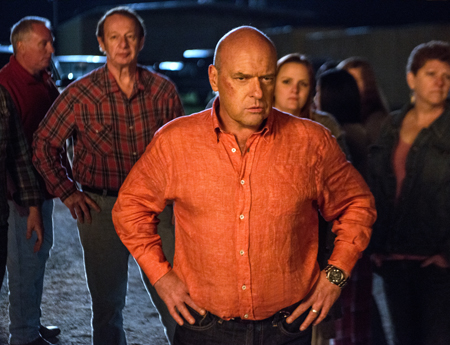Rule No. 1: Fewer Rules

The smarter way to stay on top of broadcasting and cable industry. Sign up below
You are now subscribed
Your newsletter sign-up was successful
Cable originals handily beating broadcast in the ratings? Broadcast nets telling ultra-gory horror stories? Online retailers making and distributing TV shows? Yes, it all really happened. And it points the way to an even more fascinating year ahead on the programming front. Here are some of the signposts:
Summer: The Sequel to Fall?
There were reasons to be skeptical that CBS’ Under the Dome would break out and become one of the major broadcast successes of 2013. The biggest may have been its summer play period, historically the season when cable has dominated.
Launched in late June, the 13-episode Dome, based on a Stephen King book, had undeniable popcorn appeal and delivered consistent ratings. Its finale in September drew a total of 12.1 million viewers and a 3.4 rating in the 18-49 demo, matching premiere levels, and an innovative in-season deal on Amazon Prime allowed viewers to stream current episodes four days after they aired and gave CBS revenue to offset the costs of the effects-heavy show.
Even before Dome, other broadcasters were eyeing summer. Fox has a limited return engagement of 24, along with Wayward Pines, a limited series created by M. Night Shyamalan, on this year’s schedule. ABC, NBC and the CW have made more modest bets, but all acknowledge that repeats and reality are no longer in the cards.
New Prescription for Series Dosage
A year ago, it seemed preposterous to think that one of the most talked-about new series would be delivered in bulk—all 12 episodes at once—by Netflix. House of Cards, with its lavish production values, David Fincher-helmed pilot and strong anchor performances by Kevin Spacey and Robin Wright, has captured Emmy, SAG and Golden Globe acclaim. But more important has been the industry debate its success sparked around the subject of binge viewing, which will certainly rage on this year.
The smarter way to stay on top of broadcasting and cable industry. Sign up below
Consider the antithesis to the Cards episode dump (or those of other online series): the swan song of Breaking Bad. A chart of the show’s ratings performance over five seasons details a steep upward curve, from a meager average of 1.2 million viewers in Season 1 to the finale’s robust 10.3 million.
AMC profited in many ways from that surge, orchestrating a shrewd marketing assault that built the show into a cultural monument, and the finale fetched $400,000 for each 30-second ad. That kind of build isn’t possible with a binge—and despite Cards’ acclaim, detractors wondered if the buzz evaporated prematurely due to easy availability.
AMC, which publicly saluted Netflix’ role in helping build Bad’s audience, is among a large group of nets amping up on-air marathons and binge opportunities on VOD platforms, a trend that should continue. The interesting strategic challenge for networks in 2014, though, is satisfying the appetite for bingeing without surrendering ad-revenue opportunities. Netflix, chasing subscribers, wants to superserve them and create a splash while doing so. Traditional networks have different considerations.
Fox Gets Off the Mat
Overall, the broadcast season has been a happier story than 2012-13 was, with debut hits including NBC’s The Blacklist, CW’s The Originals and CBS comedies The Crazy Ones and The Millers. But the network with arguably the most to prove is Fox. Still smarting from its dismal finish last season, the net, helped by a new corporate configuration that better showcases TV assets, boosted spending on new programming. Sleepy Hollow, possibly its biggest gamble, paid off handsomely, and the network enters 2014 with a rising new comedy in Brooklyn Nine- Nine and The Following returning for a hotly anticipated sophomore outing.
Passing the Late-Night Torch
In a drama-filled 2013 on the late-night front, Comcast brass, the new full owners of NBC, acted hastily to do what Jeff Zucker had failed to do years ago: ease Jay Leno out of his 11:30 p.m. perch. The much-debated move extends into a third decade NBC’s epic sagas with hosts in its high-profile late-night slots, which began when Johnny Carson abdicated the throne.
Leno is now set to hand the Tonight Show torch to Jimmy Fallon in February, using the Winter Olympics for promotional lift. With Jimmy Kimmel having successfully transitioned earlier on ABC and David Letterman re-upping through 2015 on CBS, the biggest question left is: Can Fallon continue Leno’s remarkable success? With football over by February, the start to 2014 will be a lot easier for NBC if the answer is yes.
